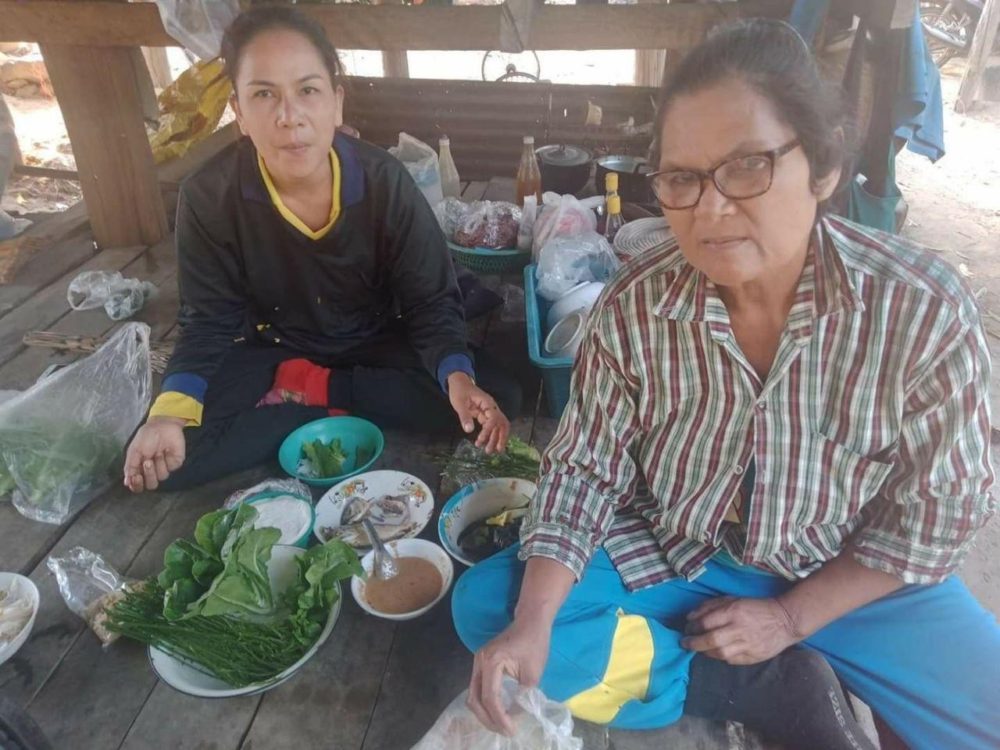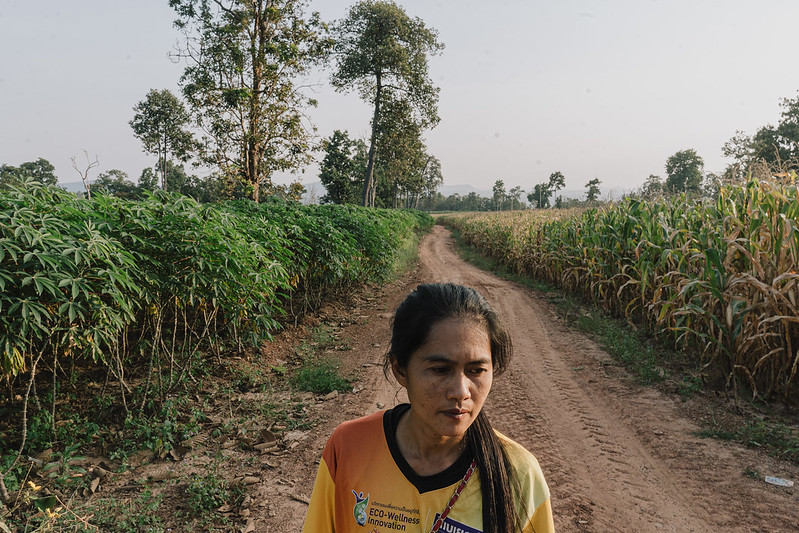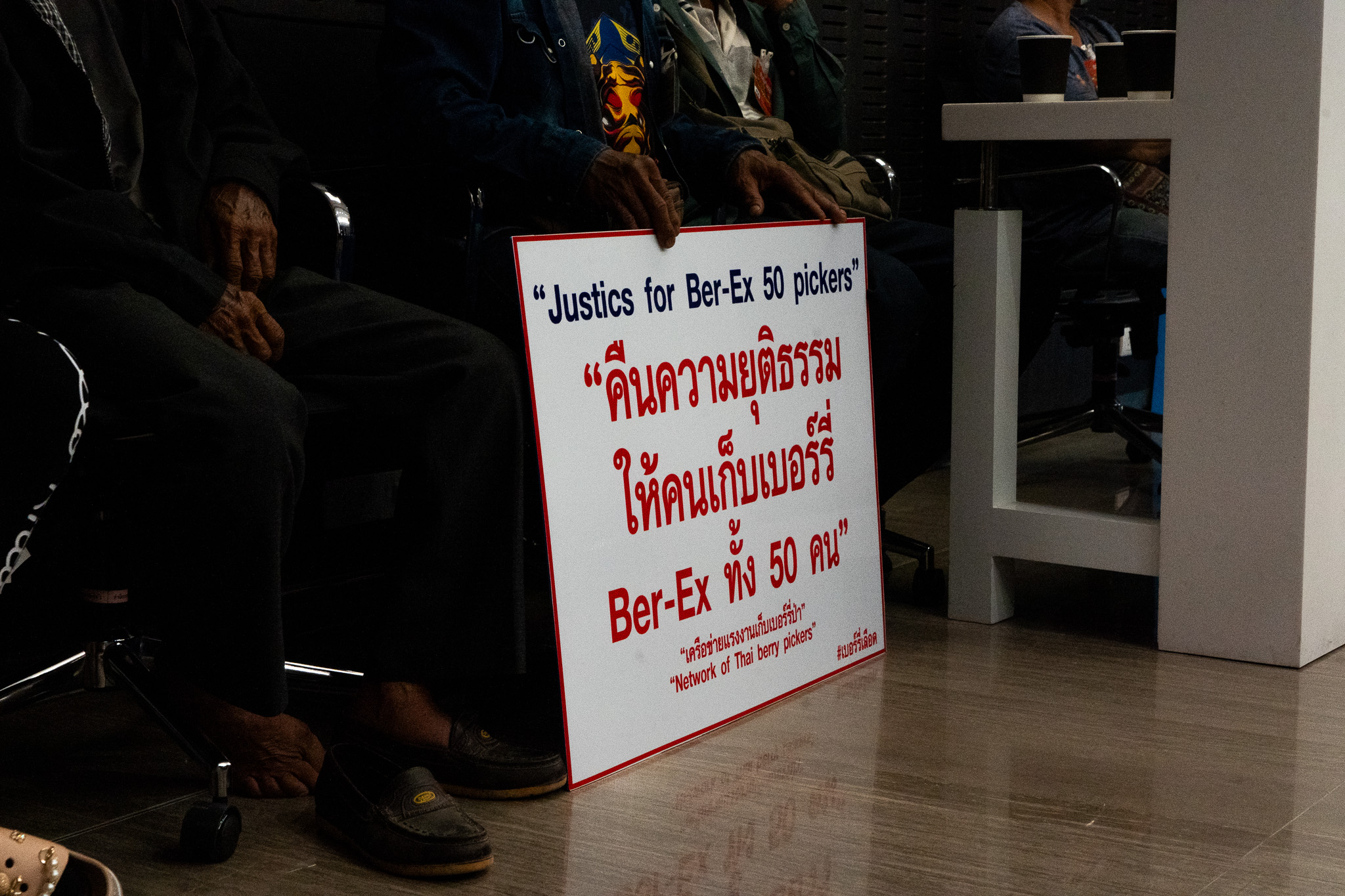
Guest contribution by Sarayuth Rittipin
A bus left the Mo Chit station in northern Bangkok on an evening last month heading for Chaiyaphum, the home province of Suwalee Phongam. The 36-year-old woman was laid off from her new job as a waitress in the wake of the COVID-19 outbreak. She returns home to a forest community that faces eviction in a long-standing land dispute with the government.
Suwalee, who goes by Nok, is one of tens of thousands of Isaan migrants who were forced to return home as employers shut down their businesses last month.
“All of the 15 employees in the restaurant were laid off,” Suwalee says. “When my mother learned the news, she said, ‘If you have to die, I’d like you to die on Isaan land. It’s better than throwing your life away elsewhere.’”

Suwalee Phongam on a bus from Bangkok’s Mo Chit bus station to her home province of Chaiyaphum after she lost her job in the middle of the Covid-19 pandemic.
Suwalee is one of the 14 villagers of Sab Wai village who were charged with land encroachment in Sai Thong National Park in Chaiyaphum province under the Forest Reclamation policy that the military junta implemented after the 2014 coup.
In July 2019, she was sentenced to five months and ten days in jail and a fine of 160,000 baht. Suwalee was released on bail after the community’s lawyer filed an appeal. Her case and those of the other villagers are currently pending with the Supreme Court.
Suwalee was looking for ways to support her family and so she decided to migrate to Bangkok.
She got a job as a waitress at a restaurant in the capital that paid 5,000 baht a month. Even with tips from customers, she hardly earned enough to cover rent, water, and electricity, not to say the small remittance for her family.
“It was like I was just trying to survive day by day and then came this pandemic. The employer announced the restaurant’s closure and I was paid only 2,500 baht for that month,” Suwalee says. “They said I had only worked half a month; there were too few customers and the restaurant was losing profit.”
Suwalee spent the money she had left to pay her rent and the rest to buy a bus ticket back home. Considering herself as a farmer, she didn’t think she was eligible for any aid from her employer or the government.
“Personally, I accept the government’s measures to close businesses to contain the outbreak,” Suwalee says. “But they didn’t come up with any employment promotion scheme or any other support for those who lost their jobs, especially the low-wage workers who rely on a daily income.”
When she became unemployed on March 15, the Prayuth government had no relief measures for unemployment. On March 26, the Social Security Office released aid packages for affected workers for the period of March to August, whether or not they were covered by the social security system.
After facing community pressure on those who had worked elsewhere who could be spreaders of the coronavirus, she underwent self-quarantine upon returning home..
Like most people in the community, Suwalee’s family is struggling to make a living from farming after this year’s drought hit the region hard. They grow cassava as a cash crop on a five-rai of land [0.8 hectares].

Suwalee and her mother during a lunch break in their cassava fields in Chaiyaphum province.
Her mother was at first hesitant about her daughter going to Bangkok.
“When she first consulted with me about going to work in Bangkok, I didn’t want her to go because she’s older now and it wouldn’t be easy for her to find a job,” says Nuanchan Phongam, 57, Suwalee’s mother. “But when she got a job, I was happy for her. When she lost the job, I told her, ‘There’s no need to work anywhere else. Come home. Stay with dad and help in the field. At least there’s food at home.’”
But the family’s fate still hangs in the balance and they might soon be forced to leave the land they say they’ve been working for generations.
If the Supreme Court rules that the community’s farming on national park land is illegal, Suwalee and the other defendants could be arrested and sent to serve out prison sentences, said Thanomsak Rawadchai, a lawyer at the Human Rights Study and Development Center, who is representing the community.
Suwalee recently learned she may be eligible for some aid from the government and has made an application.
In the meantime, Suwalee’s life is also pending: no longer employed when she should have been the family’s breadwinner, hoping for government aid, and waiting for the outcome of the Supreme Court’s decision on a forest invasion charge.
The Employers’ Confederation of Thai Trade and Industry estimates that at least 6.5 million will be out of work within April due to the COVID-19 outbreak. About one million workers in the restaurant and retail sector have been affected, according to a news report by Matichon.
Last month, about 144,000 people signed up for unemployment benefits, a 72 percent increase from the figure in February, according to the Department of Labor, Ministry of Labor.
The Covid-19 outbreak has seen workers around the world sharing the same fate. In an initial assessment, the International Labour Organization (ILO) said 25 million people could be pushed into unemployment.




